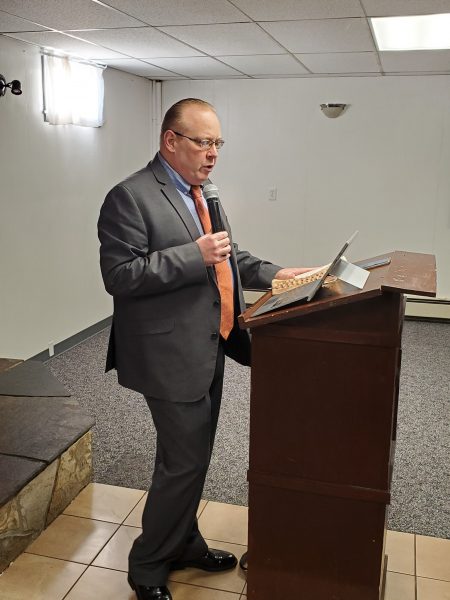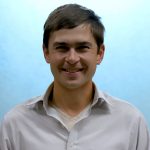
Brad Schrack is the pastor at Antioch United Pentecostal Church of Anchorage, one of the few churches that have managed to open since state mandates allowed in-person services. He preached to just over a dozen congregants at a service on Sunday, the first time in months they’d got together in person.
“What I felt when everybody was there was just more of a relief to finally there was some normalcy,” he said.
At the service, also streamed through Facebook Live, he joked that there’s no more falling asleep since now he can see everybody in the room.
Schrack said it was still difficult to get used to the restrictions. Tables and pews were removed, and hand-shaking or hugging wasn’t allowed. Cloth pews were replaced by hard plastic chairs that are easier to wipe down.
Get the latest coverage of the coronavirus, culture and the economy in Alaska
Schrack said he wasn’t trying to make a political statement by opening, but it just felt right.
“It wasn’t an overt thing: ‘Hey we just gotta,’ you know, there’s pressure to do it, but there is a sense of ‘Wait a minute, this is essential in my life, and it’s essential to people that come to our church’s life,’ and that’s what a lot of them said, it’s just good to be back home,” he said.
He said he’s worried about what’s going to happen to people who are isolated in their homes. He’s heard of rising rates of depression and domestic abuse, and thinks that in-person church services offer an antidote to that. While he acknowledges the risk, Schrack, who has Type-2 Diabetes, said there’s risks in everything.
“Putting myself in the house doesn’t protect me from a heart attack,” he said.
But, he said, he’s still following all the state’s rules.
“As long as the government goes by the data as they said and only really tightens things back up if, you know, the healthcare system begins to get stressed, then I’ll be good with that,” he said.
But not every church thinks it’s time to open. Antioch church is small – at most has about 20 congregants. That’s the maximum number mandated by the state and the city’s guidelines.
Larger churches have to make a different calculation.
“The biggest concern is space,” said Shane Paulsen, an administrative pastor at Anchorage’s Cornerstone Church.
With a congregation of several hundred, he said, the church decided it wasn’t feasible to meet state guidelines so that everyone who wanted could attend.
“What do you do with all the kids? What are the options there? There’s so many parameters to take into account with that. We would have to have, probably a service every day of the week to be able to comply with the standards set,” he said.
Paulsen said that there’s also new social dynamics that church leadership isn’t comfortable with.
“Some people are gonna be hypersensitive to all this, some people are gonna be like, ‘I’m done with this, let’s go for it,’” he said.
Anchorage’s largest churches by-and-large are saying that they’re keeping their doors shut to in-person services for now, and it’s not entirely sure when that will change. There are just too many factors to take into account, they said.
It’s a painful decision to have to make, and few have more on the line than the Muslim community, which is currently in the middle of its month-long celebration of Ramadan, the holiest month of the Islamic calendar.
Youssef Barbour is the spokesperson for the Islamic Community Center of Anchorage, Alaska. He said that it’s particularly difficult because normally Ramadan is a time that Muslims refrain from pleasures like smoking and sexual contact during the daily fast. Community helps people get through the month.
“It’s very intense or heavy in social activities getting together. And because we, you know, this peer support or this support where everybody’s doing it together, it makes it easier,” he said.
Celebrations, like the nightly iftar feast, are now done just with nuclear families as are the daily prayers, some of which last over an hour.
“It’s really hard if you’re just by yourself, because you’ll find an excuse not to do it. But if you know that you’re going to go there and there will be people,” he said.
But, just like other religious groups, the Islamic community is finding some silver linings in staying at home. Barbour said his 9-year-old daughter is more interested than ever in following the day-time fasting traditions her parents are observing.
“She’s sleeping as much as she can during the day so that she can minimize the amount of time she actually has to go through the hunger,” he said.
A previous version of this story misidentified Antioch United Pentecostal Church of Anchorage. The church is the Antioch United Pentecostal Church of Anchorage, not the Antioch United Methodist Church.
Lex Treinen is covering the state Legislature for Alaska Public Media. Reach him at ltreinen@gmail.com.





